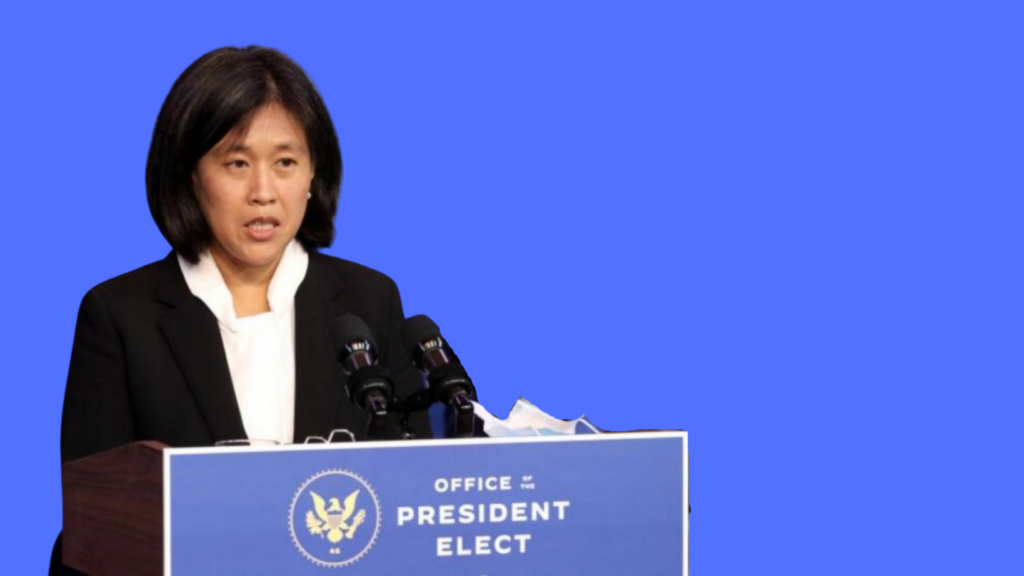Globalization in its current form is no longer sustainable, USTR Katherine Tai said at an event at the National Press Club last week.
Tai talked about broken supply chains and how we lost our economic resilience by sacrificing it for efficiency and price – as in the lowest price.
“Let me take a moment to explain how designing a system around efficiency and low costs got us here. Trusting markets to allocate capital efficiently, we designed trade rules to liberalize as much as possible, under the theory that we were facilitating the creation of a free global marketplace.
We thought a rising tide would lift all boats, believing that this approach could lead to a gradual improvement in labor standards and environmental protection as countries grew wealthier from increased trade flows. We did not include guardrails to ensure that it would be the case.
The system itself, then, created an incentive for countries to compete by maintaining lower standards, or by lowering their standards even further, as companies sought to minimize costs in pursuit of maximizing efficiency. This is the race to the bottom, where exploitation is rewarded and high standards are abandoned in order to compete and survive.
When efficiency and low cost are the only motivators, production moves outside our borders. It becomes increasingly consolidated in one economy—such as China — which manipulates cost structures, controls key industries, and became a dominant supplier for many important goods and technologies.” – Katherine Tai, June 2023, National Press Club, Washington DC.
Supply chains were a big focus of her speech. She said supply chain resiliency is part of any competitive policy in the United States. Weak and reliant supply chains will not be able to overcome competitive, domestic manufacturing policies, like the Inflation Reduction Act.
She said that China-centric supply chains are at the risk of “economic coercion” on the part of the Chinese Communist Party.
“Fragile supply chains and an unsustainable version of globalization demanding reform and improvements,” she said. “It is abundantly clear that these challenges have implications for competition policy, as well as trade policy. Resilient supply chains are vital for greater national and economic security.”
She explained what she meant by greater supply chain resilience:
“We mean production that can more easily and quickly adapt to and recover from crises and disruptions. It means having more options that run through different regions. Getting there requires a fundamental shift in the way we incentivize decisions about what, where, and how we produce goods and supply services,” she said.
Tai said that existing trade policy focused on supply chains in low-cost producer nations, which made the U.S. vulnerable. Her speech suggests that the big thinkers in the current USTR and White House are trying to figure out how to continue with those global trade policies while keeping one eye on supply chain diversity and another on labor. This may end up proving to be a very challenging task, however, as undervalued currencies mean labor markets will always be better priced in Asia and Mexico. Moreover, there is little to no real appetite in these countries to follow the West’s example in going green and restricting greenhouse gas emissions.
However, she did highlight how the new USMCA, the NAFTA revamp, had a strong labor component which makes it easier for the U.S. to go after Mexico on worker costs. Mexican steel conduit manufacturers are also being accused of dumping products in the United States.
Working with Mexico may be easier than working with China, but the allied approach is not without its challenges as companies, like countries, have their own self-interests at heart.
“The traditional trade policy approach historically focused on providing benefits for our biggest companies, on the theory that those benefits would necessarily trickle down to our workers, small businesses, and communities. But over time, what we have seen is that these benefits do not trickle very far down,” Tai said.
The International Trade Commission wrote a report on this in 2021.
Tai said that the Indo-Pacific Economic Framework was a way for the U.S. to become less dependent on sole-source suppliers in China.
“We need a new model for doing trade to adapt to the challenges presented by the world we are living in. And we are doing this in cooperation with our allies and partners, not at their expense.
Instead of supply chains designed to extract from developing economies, our approach is to partner together, where we are all co-owners of different parts of supply chains. This makes perfect sense in terms of de-risking and building resilience. The key is to offer economies a spot in vertical integration so that developing countries are not perpetually trapped in an exploitative cycle.
We all aspire to build our economies from the bottom up and the middle out—to provide those at the bottom with a path to the middle, and to build a broad middle class. We do this by collaborating in ways that allow us to create opportunities and build our middle classes together, rather than pitting them against each other.” – Katherine Tai, National Press Club
Tai has long championed a labor-centric trade model, whereas any new trade arrangement has to be one that does not cause too much damage to blue-collar manufacturing labor, primarily.
Tai’s speech at the National Press Club was sponsored by the Open Markets Institute, and their debate titled “The Next World System: Can US Trade Policy Make Us More Secure, Democratic, & Prosperous?”













